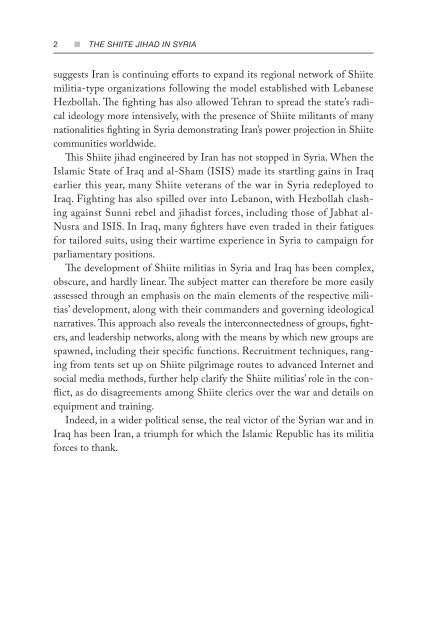You also want an ePaper? Increase the reach of your titles
YUMPU automatically turns print PDFs into web optimized ePapers that Google loves.
2 n <strong>THE</strong> <strong>SHIITE</strong> <strong>JIHAD</strong> <strong>IN</strong> <strong>SYRIA</strong><br />
suggests Iran is continuing efforts to expand its regional network of Shiite<br />
militia-type organizations following the model established with Lebanese<br />
Hezbollah. The fighting has also allowed Tehran to spread the state’s radical<br />
ideology more intensively, with the presence of Shiite militants of many<br />
nationalities fighting in Syria demonstrating Iran’s power projection in Shiite<br />
communities worldwide.<br />
This Shiite jihad engineered by Iran has not stopped in Syria. When the<br />
Islamic State of Iraq and al-Sham (ISIS) made its startling gains in Iraq<br />
earlier this year, many Shiite veterans of the war in Syria redeployed to<br />
Iraq. Fighting has also spilled over into Lebanon, with Hezbollah clashing<br />
against Sunni rebel and jihadist forces, including those of Jabhat al-<br />
Nusra and ISIS. In Iraq, many fighters have even traded in their fatigues<br />
for tailored suits, using their wartime experience in Syria to campaign for<br />
parliamentary positions.<br />
The development of Shiite militias in Syria and Iraq has been complex,<br />
obscure, and hardly linear. The subject matter can therefore be more easily<br />
assessed through an emphasis on the main elements of the respective militias’<br />
development, along with their commanders and governing ideological<br />
narratives. This approach also reveals the interconnectedness of groups, fighters,<br />
and leadership networks, along with the means by which new groups are<br />
spawned, including their specific functions. Recruitment techniques, ranging<br />
from tents set up on Shiite pilgrimage routes to advanced Internet and<br />
social media methods, further help clarify the Shiite militias’ role in the conflict,<br />
as do disagreements among Shiite clerics over the war and details on<br />
equipment and training.<br />
Indeed, in a wider political sense, the real victor of the Syrian war and in<br />
Iraq has been Iran, a triumph for which the Islamic Republic has its militia<br />
forces to thank.


